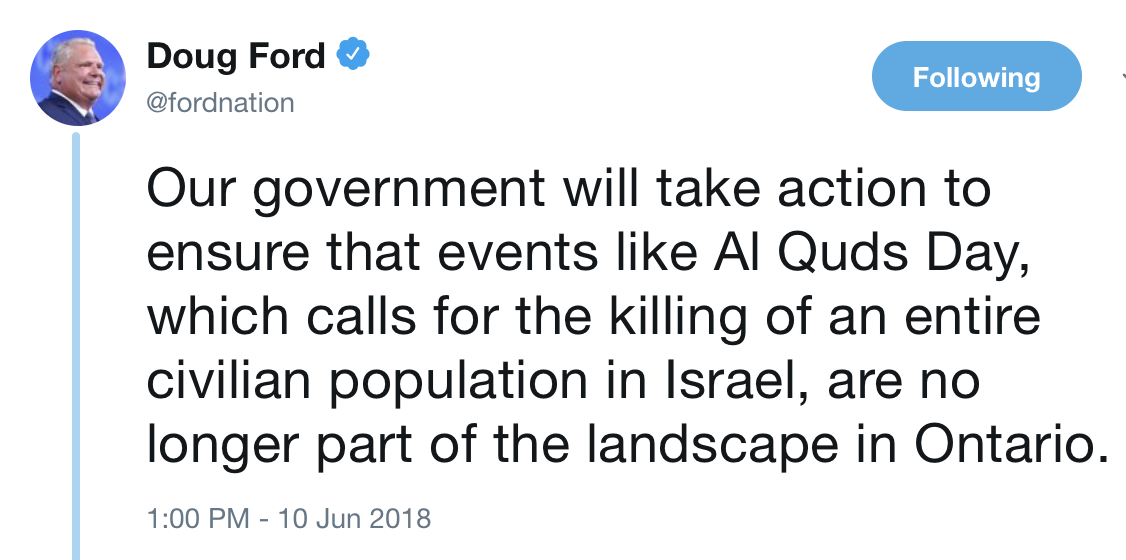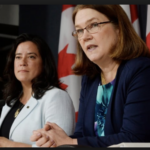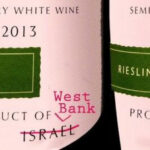April 18, 2019
With the support of Ontario’s right-wing Premier, Doug Ford, a staunchly pro-Israel member of Ontario’s legislature is pushing a private member’s bill designed to silence critics of Israel.
The proposed law, Bill 84, is a frontal assault on the rights to free speech, free assembly and free association.
It cannot withstand constitutional scrutiny.
What is Bill 84?
Bill 84 is entitled “An Act to amend the Legislative Assembly Act respecting demonstrations that promote hatred on legislative precinct grounds.” The Bill declares that “No demonstration, rally or other activity that, in the opinion of the Speaker, is likely to promote hatred against any identifiable group shall be permitted on legislative precinct grounds.”
Bill 84 defines “legislative precinct grounds” as “the area of land in the City of Toronto bounded on the east, south and west by Queen’s Park Crescent and on the north by Wellesley Street West.” These are the grounds of Ontario’s legislature. That site’s political importance is obvious: citizens who are dissatisfied with Ontario government policy frequently assemble there to express their dissent. Barring a citizen from peacefully demonstrating on the grounds of Ontario’s legislature is no trifling matter.
The author and promoter of Bill 84 is Conservative MPP Roman Baber of the riding of York Center. Baber spent much of his childhood in Israel. In his public commentary, he has defended Israel and denounced its critics.
Although Bill 84 makes no reference to Israel, the history of this deeply flawed legislation leaves little doubt that its primary target is the Al Quds Day rally held annually in Toronto.
What is Al Quds Day?
In Arabic, “Al Quds” means the city of Jerusalem. Al Quds Day is an annual event held around the world to protest Israel’s illegal annexation of Jerusalem and its occupation of and settlements in Palestinian territory.
United Nations General Assembly Resolution 181, passed on November 29, 1947, declared that Jerusalem “shall be established as a corpus separatum under a special international regime and shall be administered by the United Nations.” Israel, however, has never respected the will of the United Nations with respect to Jerusalem. All the while, Israel has claimed the benefits of the United Nations’ unjust plan for the partition of Palestine.
In 1967, during the Six-Day War, Israel began to occupy East Jerusalem. More than fifty years later, that interminable occupation grinds on. Even worse, throughout the more than 50 years that have elapsed since the occupation began, Israel has established numerous, Jewish-only settlements there and, in 1980, Israel purported to annex East Jerusalem.
The international community — including the Canadian government – has repeatedly acknowledged that Israel’s settlements and annexation of East Jerusalem constitute grave and flagrant violations of international law, including the Fourth Geneva Convention.
For Muslims, Israel’s occupation and annexation of East Jerusalem are not only violations of international law and the human rights of the Palestinians who reside there, they are also an affront to Islam. East Jerusalem is home to the Al Aqsa Mosque, the third holiest site in Islam. Since the occupation began, Israeli forces have repeatedly restricted Muslims’ access to Al-Aqsa.
For decades, Palestinian solidarity activists have protested Israel’s crimes on Al Quds Day, which falls on the last Friday of the holy month of Ramadan. Fanatically pro-Israel groups, including the Center for Israel and Jewish Affairs, B’nai Brith Canada and the Friends of Simon Wiesenthal Center, have agitated with increasing ferocity for the City of Toronto and the Ontario legislature to shut down the Al Quds Day rallies in Toronto. The basis of their calls to silence the Al Quds Day rallies – which perennially include participation from members of the Jewish community – is the false claim that the rallies are ‘hate-infested.’
Despite their allegations, no participant in an Al Quds Rally in Toronto has ever been charged – let alone convicted – of having committed a hate crime.
Despite that fact, in 2018 the Executive Committee of Toronto City Council warmly received the advice of Meir Weinstein to search for ways to ban the Al Quds Day rallies. Weinstein is the director of the Jewish Defence League Canada (JDL), a violent, far-right extremist group whose members have been charged with hate crimes in Washington, D.C.
Within days of his election in 2018, Doug Ford escalated the smear campaign against Al Quds Day protesters and vowed to do the bidding of the JDL and other pro-Israel groups:

Shortly after Doug Ford made that vow, Ford proudly posed for a photograph with white supremacist Faith Goldy, a hate-monger who has promoted fascist literature calling for elimination of the ‘Jewish menace.’ Days ago, Goldy was banned from Facebook for her hateful rants.
Why is Bill 84 Unconstitutional?
Section 2 of the Canadian Charter of Rights and Freedoms (“Charter”) declares that everyone enjoys the following fundamental freedoms: freedom of conscience and religion; freedom of thought, belief, opinion and expression; freedom of peaceful assembly; and freedom of association.
In the case of Irwin Toy Ltd. v. Quebec (Attorney General), the Supreme Court of Canada outlined the analysis to be undertaken to determine whether there has been a violation of the right to freedom of expression. The analysis requires the court to pose and answer three questions:
- Does the citizen’s conduct or statement have expressive content?
- If so, does the location or method of this expression remove that protection?
- If the expression is protected by section 2 of the Charter, does the government action or legislation infringe that protection, either on purpose or effect?
Do the Al Quds Day rallies have expressive content?
The fundamental purpose of the Al Quds Day rallies is to express opposition to Israel’s policy of dispossessing Palestinians from East Jerusalem and to demand Israel’s respect for international law and the rights of Palestinians. Accordingly, there can be no doubt that the Al Quds Day rallies have expressive content.
Does the location or method of this expression remove that protection?
Location: As stated above, the grounds of Ontario’s legislature have long been viewed by the people of Ontario as a key venue for expressions of opposition to government policy. Thus, there is nothing inherently problematic about the use of that venue to demand Israel’s respect for international law and Palestinian rights.
Method: One might well argue that expressions of hatred constitute a method of communication that does not merit constitutional protection. However, unlike the Criminal Code of Canada, which contains provisions relating to hate crimes, Bill 84 provides no direction whatsoever as to the question of what constitutes hate speech.
Section 319 of the Criminal Code declares it an offence for an individual to communicate a statement, other than in private conversation, which wilfully promotes hatred against any “identifiable group”. Section 319(7) of the Criminal Code defines “identifiable group” as “any section of the public distinguished by colour, race, religion, national or ethnic origin, age, sex, sexual orientation, gender identity or expression, or mental or physical disability.”
Further, section 319(3) of the Criminal Code provides that:
No person shall be convicted of an offence under subsection (2)
(a) if he establishes that the statements communicated were true;
(b) if, in good faith, the person expressed or attempted to establish by an argument an opinion on a religious subject or an opinion based on a belief in a religious text;
(c) if the statements were relevant to any subject of public interest, the discussion of which was for the public benefit, and if on reasonable grounds he believed them to be true; or
(d) if, in good faith, he intended to point out, for the purpose of removal, matters producing or tending to produce feelings of hatred toward an identifiable group in Canada.
By contrast, Bill 84 does not define “identifiable group”, nor does it establish any defences. It contains no provisions that are designed to ensure procedural fairness to those wishing to hold a demonstration on the grounds of the legislature. Moreover, Bill 84 does not specify the penalties that would be applied to those who refuse to comply with a determination by the Speaker that a proposed demonstration is likely to promote hatred. Bill 84 does not even require the Speaker’s judgment in such matters to be reasonable or to be based upon cogent and reliable evidence.
Given the vital importance to our democracy of the rights to free speech, free assembly and free association, no governmental official or private citizen should be clothed with unfettered discretion to decide what kinds of speech are permissible on the grounds of the legislature.
Even worse, the current Speaker of Ontario’s legislature, Conservative MPP Ted Arnott, has demonstrated a strong bias against those who demand that Israel be held accountable for its crimes.
In 2016, Arnott voted in favour of a resolution in the Ontario legislature condemning the BDS movement. The essential goal of the BDS movement is to ensure — by non-violent, political and economic means — that Israel respect the human rights of the Palestinian people.
In 2010, Arnott also supported a resolution condemning the term “Israeli Apartheid Week” on the grounds that that term “serves to incite hatred against Israel.” In explaining his support for the resolution, Arnott declared that “I’ve always believed the state of Israel to be a free and democratic state with individual freedoms, free elections and a commitment to human rights.”
As documented, however, by Professors Virginia Tilley and Richard Falk — a leading scholar of international law who happens to be of Jewish origin — the evidence that Israel is committing the crime of apartheid is “overwhelming.” World-renowned intellectual Noam Chomsky, who is also Jewish and who is the child of Holocaust survivors, argues that Israel’s treatment of Palestinians within the occupied territories is “much worse than apartheid” in South Africa. Within Israel itself, respected individuals such as Haaretz journalist Gideon Levy and David Harel, Vice-President of Israel’s Academy of Sciences and Humanities, insist that Israel has imposed an apartheid regime on Palestinians.
Thus, the claim that Israel is committing the crime of apartheid is plainly a legitimate form of expression. It is also a view that is commonly expressed at Al Quds Day rallies in Toronto. Arnott evidently believes, however, that the charge of apartheid “serves to incite hatred against Israel.”
Palestinian solidarity activists therefore have every reason to fear that Arnott would abuse his unfettered discretion under Bill 84 to prevent them from demanding on the grounds of Ontario’s legislature that Israel end its racist policies and practices against Palestinians.
Does the government action or legislation infringe that protection, either on purpose or effect?
Because Bill 84 confers upon the Speaker of Ontario’s legislature the unfettered discretion to bar rallies on the grounds of the legislature which meet his own, idiosyncratic definition of hate speech, Bill 84 clearly infringes on the constitutional rights to free speech, free assembly and free association.
Could Bill 84 be Saved by Section 1 of the Charter?
Section 1 of the Charter states that the Charter “guarantees the rights and freedoms set out in it subject only to such reasonable limits prescribed by law as can be demonstrably justified in a free and democratic society.” [Emphasis added.]
Thus, the rights to free speech, free assembly and free association are not absolute. The Supreme Court of Canada has held, however, that a restriction on a Charter right satisfies section 1 of the Charter only if that restriction satisfies the following requirements:
Two central criteria must be satisfied to establish that a limit is reasonable and demonstrably justified in a free and democratic society. First, the objective to be served by the measures limiting a Charter right must be sufficiently important to warrant overriding a constitutionally protected right or freedom. The standard must be high to ensure that trivial objectives or those discordant with the principles of a free and democratic society do not gain protection. At a minimum, an objective must relate to societal concerns which are pressing and substantial in a free and democratic society before it can be characterized as sufficiently important. Second, the party invoking s. 1 must show the means to be reasonable and demonstrably justified. This involves a form of proportionality test involving three important components. To begin, the measures must be fair and not arbitrary, carefully designed to achieve the objective in question and rationally connected to that objective. In addition, the means should impair the right in question as little as possible. Lastly, there must be a proportionality between the effects of the limiting measure and the objective ‑‑ the more severe the deleterious effects of a measure, the more important the objective must be.
In the interests of brevity, I will not offer here an exhaustive analysis of the application of section 1 of the Charter to Bill 84. Rather, I will limit myself to discussing one particular flaw in this legislation.
Under Bill 84, the Speaker is not limited to banning individuals who engage in hate speech from the grounds of the legislature. Rather, Bill 84 empowers the speaker to ban ‘demonstrations, rallies or other activity.’
This broad language is problematic from a constitutional perspective because, within any demonstration or rally – particularly large demonstrations and rallies – one invariably encounters a diversity of views.
Let us consider one of the accusations that pro-Israel groups have repeatedly levelled against the Toronto Al Quds Day rally, namely, that some of the participants in these rallies have displayed the flag of Hezbollah, which the Canadian and other Western governments have declared to be a terrorist organization.
For the sake of argument, I will assume that the display of a Hezbollah flag constitutes a form of hate speech.
There is no evidence that more than a tiny handful of Al Quds Day demonstrators have displayed Hezbollah flags at past rallies. Anyone who has attended one of these rallies, as I have, can readily see that the overwhelming majority of the participants do not display the flag of Hezbollah and do not engage in any other expressions of support for Hezbollah. Moreover, the organizers of the Toronto Al Quds Day rallies have confirmed that they have never authorized or encouraged the display of Hezbollah flags at the rallies and that they do not know the identities of the few persons who have displayed such flags at past rallies.
There is no justification for banning an entire rally simply because a few of its participants, acting on their own initiative and without the approval, encouragement or assistance of the organizers, engage in conduct that arguably constitutes hate speech. Banning the entire rally would offend the Charter principle that a limitation on a constitutional right must be fair and not arbitrary and must impair that right as little as possible. At a minimum, in order to satisfy that principle, the Speaker’s ban would have to be limited to the display of the Hezbollah flag and/or to the particular individuals who have displayed the flag of Hezbollah in the past.
If Bill 84 was truly designed to target hate speech and was not designed to stifle criticism of Israel, then the Bill would oblige the Speaker to impose a ban that is as limited in scope as possible. But the Bill goes far beyond this and empowers the Speaker to ban entire rallies, even if the vast majority of the participants in those rallies have never engaged in any activity that constitutes hate speech.
For that reason alone (among others), Bill 84 does not satisfy the requirements of section 1 of the Charter. It is, in reality, a thinly disguised attempt to stifle criticism of an apartheid regime.
The ultimate irony here is that the pro-Israel groups and politicians who are promoting this unconstitutional legislation, and who would ultimately determine how it will be applied, are the true purveyors of hate. Indeed, defending an apartheid regime that for decades has brutally oppressed millions of people on the basis of their ethnicity is the quintessence of hate speech.
-
[…] be the Speaker of the legislature, Ted Arnott of Doug Ford’s Conservative Party. As I have previously written, Arnott has demonstrated a strong bias in favour of Israel. Most notably, in 2010, Arnott supported […]






“For Muslims, Israel’s occupation and annexation of East Jerusalem are not only violations of international law and the human rights of the Palestinians who reside there, they are also an affront to Islam. East Jerusalem is home to the Al Aqsa Mosque, the third holiest site in Islam. Since the occupation began, Israeli forces have repeatedly restricted Muslims’ access to Al-Aqsa.”
Understood. I have zero sympathy for nazi Israel and all the sympathy in the world for its Palestinian victims. But, really, Will people risk their, and their children’s, lives for religious symbols? Because if the answer is yes, I have no doubt that God does ‘not’ approve. And those ones show their lack of faith that God – not imperfect humans in any number – will fix things.